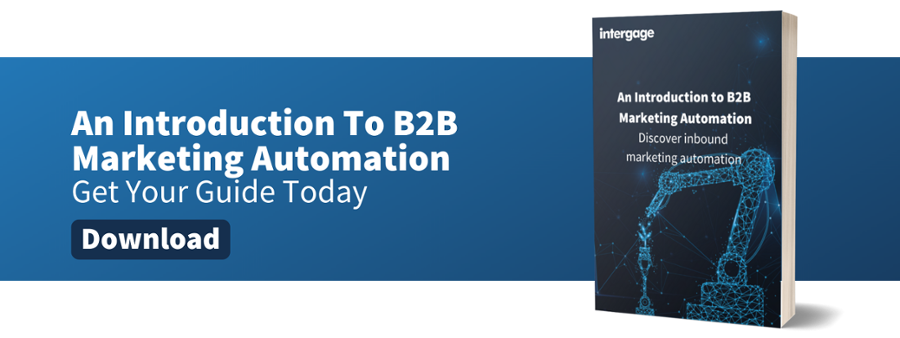Marketing Automation - The Executive Summary
Why Marketing Automation?
Smart B2B businesses understand that buyer behaviour has changed. They know that marketing effectively in today's climate means creating better content and using marketing automation software to automatically nurture larger, more predictable pipelines of sales enquiries.
What is Marketing Automation?
Your B2B buyers are intelligent and empowered by instant and 24/7 access to information. They start researching well before the point of purchase to become hyper-informed – and they don't want to engage with your sales people until they really have to (if at all).
Marketing automation is the science (and art) of helping informed buyers through their journey – using software to understand their behaviour, serve them appropriate content and automate processes to further engage them.
Success requires the creation of specific digital content (emails, web pages, blog posts, videos and whitepapers, for example) for specific types of buyers at specific stages of their buying journey.
Streamlining the delivery of this content by defining and then automating workflows and processes saves time and money and improves the customer experience.
Businesses can now define processes and workflows to:
- attract more enquiries
- automatically nurture leads over time to create warmer, better-informed prospects
- detect when potential buyers are becoming purchase-ready by monitoring and scoring their online behaviour and the content they consume
- surface warmer, better qualified leads for your sales team to engage with
-
help your team provide a better service to customers during and post sale.
What is the problem?
A typical B2B marketing manager is managing upwards of a dozen different systems for attracting, engaging and delighting customers. It's not unusual to find a B2B marketing manager juggling:
- a CMS (Content Management System) system for updating the website
- a CRM system (which sales people are supposed to update but often don't)
- sales data from an accounting system
- a customer support system for logging customer support calls and issues
- a blogging system
- email marketing systems for creating and delivering email campaigns
- analytics systems such as Google Analytics for identifying where visitors come from and where they go while on a website
- IP tracking systems to try and identify who has visited their website
- multiple social platforms for posting updates (YouTube, LinkedIn, Twitter, Facebook, Instagram etc.)
- scheduling systems for programming social media posts
- systems for monitoring mentions of the company or its brands online
- Google Ads, LinkedIn ads, Facebook ads and other online systems for advertising.
Employing so many individual systems can create a number of problems:
- How many sources of customer data does the organisation now have (and how big a GDPR headache is that)?
- What are the chances of your customer data being consistent across all these systems?
- Which system is providing you with a true picture? (They almost all measure and report numbers in different ways.)
- Integrations between systems are notoriously flaky and often break when one system or another is updated.
- How do you automate processes across so many different systems?
How does marketing automation solve these problems?
By defining your marketing processes and skilfully creating content for your target customers you can use marketing automation to:
- reduce the cost of lead generation
- nurture every lead automatically 24/7
- monitor your lead pipelines
- create warmer, better educated, better qualified leads
- close more business
- increase customer satisfaction.
Marketing automation software helps you by:
- reducing the number of different customer databases – ideally to one (or one plus an accounting system)
- providing a single, joined-up system with a single source of accurate and consistent customer information
- providing a single, consistent interface for the user and (ideally) a single toolkit to manage the marketing process
- defining workflows and automating processes to improve customer service and reduce sales costs (which becomes exponentially simpler as you reduce the number of systems involved).
How does marketing automation work?
Marketing Automation joins up disparate systems to provide valuable insights about your customers' and prospective customers' behaviour; which website pages they visited, which blog posts they read, which emails they opened, which social media posts they responded to and which white papers they downloaded.
You can use this information to trigger workflows and automatic processes.
A simple example; a customer opens a marketing email and clicks a specific link before downloading a white paper. Your marketing automation system can be programmed to send a relevant follow-up email message with further information. It could detect that the follow-up email was opened and then schedule a timely call for a sales person to follow up a warm lead.
Your marketing automation system is helping your prospective clients through their buyer's journey 24/7 and delivering warm prospects to your sales team.
Alternatively, your customers could be opening emails, visiting key web pages, reading blogs and downloading white papers and your team may never be able to join the dots to reveal the picture of a customer whose behaviour screams, "Help me buy!"
What challenges will we face implementing a marketing automation system?
No marketing automation system comes with a free marketing strategy. It is impossible to automate processes that don't exist, so many companies need help to become automation-ready.
Becoming automation-ready means you:
- have created detailed marketing personas
- have defined life cycle stages and lead scoring models
- have a marketing strategy broken down into campaigns
- have identified clear goals for your automation project and you know what success looks like
- have workflows and processes ready to automate
- have branded social platforms in place
- have a website with a blog
- have a CRM system
- know how your marketing automation platform works and you can configure it to meet your needs.
Becoming automation-ready is a journey. Intergage is here to help you become ready and to guide you through that process.
How is it delivered?
Marketing automation requires strategy, planning, software and content.
If you'd like to find out more about working with a digital marketing and marketing automation specialist like Intergage, call us now for an initial discussion or a demonstration of the power of marketing automation.
If you would like more information first, download the our introductory e-Book below.





